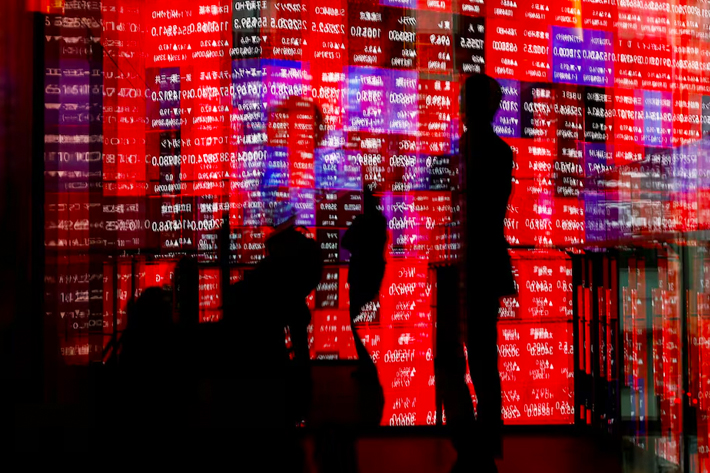Stocks in Asian markets sank on Wednesday as traders wrestled with a major selloff and some of the highest volatility seen in months.
Sellers were harsh on Japanese and South Korean markets after valuation fears spurred a fall on Wall Street. Stocks that had made dizzying rallies recently took a beating.
The selling eased in the Asian afternoon, but the size of the moves in each direction underscored the nervous feeling among investors.
ALSO SEE: India’s Big Plans To Decarbonise Industries Struggle To Take Off
Tokyo’s stock index plunged by almost 7% from the record high reached on Tuesday, and after paring losses was last down 2.8%. South Korean shares dropped by 6.2% before clawing back some losses to be down 2.9%.
MSCI’s broadest index of Asia-Pacific shares outside Japan was down as much as 2.3%, the most since US President Donald Trump’s Liberation Day tariff announcement in early April, and last traded 0.9% lower. US e-mini futures slid 0.1% to extend losses after a 1.2% drop for the S&P 500 overnight.
‘Profits taken on AI stocks’
“Investors are sitting on huge stock market gains, and some might have taken profits today, especially in AI-related stocks,” Ed Yardeni of Yardeni Research wrote in a research report.
Stocks are retreating from record highs on fears equity markets may have become overstretched after the CEOs of Wall Street heavyweights Morgan Stanley and Goldman Sachs questioned whether sky-high valuations can be sustained.
Last month, Jamie Dimon, the CEO of banking giant JPMorgan Chase, warned of a heightened risk of a significant correction in the US stock market within the next six months to two years.
The warnings come as a surge in enthusiasm for generative AI has swept across stock markets worldwide this year, drawing comparisons to the dotcom bubble.
“At some point, profits need to be booked. Especially when we’ve seen repeatedly solid runs to record highs,” Matt Simpson, a senior market analyst at StoneX in Brisbane, said. “Those with money on the line aren’t likely seeking answers right now – they’re just copying each other like kids in an exam. And the answer is to run.”
SoftBank, SK Hynix, Samsung all dive
In Japan, shares in SoftBank Group dived as much as 14.3% as traders digested how one of the world’s biggest tech sector investors would be affected by a 2% drop in the Nasdaq Composite overnight.
And in Seoul, SK Hynix dropped as much as 9.2% and Samsung Electronics fell as much as 7.8%.
Chinese shares rallied following an initial dip after a private sector gauge of service sector PMI activity expanded at its slowest pace in three months.
The CSI 300 was last up 0.5% as the State Council’s tariff commission said it would suspend its 24% additional tariff on US goods for one year but retain a 10% levy following last week’s meeting between President Xi Jinping and US President Donald Trump.
The US dollar dropped against the yen but later rallied to trade flat at 153.655 after the release of minutes from the Bank of Japan’s September policy meeting.
The European single currency was last 0.1% firmer at $1.1488 after hitting a three-month low following five straight days of declines.
The dollar index, which tracks the greenback against a basket of currencies of other major trading partners, edged back after touching a five-month high of 100.25 and was last trading flat.
The yield on benchmark 10-year Treasury notes reached a low of 4.0542% compared with its US close of 4.091% on Tuesday, before edging back up to 4.0774%.
Bitcoin fell below $100,000 for the first time since June and was choppy afterwards, with the cryptocurrency last up 1.5% at $101,814.50. Gold rebounded after three consecutive days of losses, and was trading 1% higher at $3,971.60 per ounce.
Brent crude was last 0.1% higher at $64.51 per barrel.
- Reuters with additional editing by Jim Pollard
ALSO SEE:
China’s Shein Faces a Fierce Fashion Fight in France
Starbucks Sells Control of China Stores to HK Equity Firm Boyu
China Moves to Boost Tourism With Visa-Free Policy to End-2026
US Supreme Court May Delay, But Likely Not Stop Trump’s Tariffs
Chinese Manufacturing Slumps to Six-Month Low, as Exports Fall
Trump Cuts US Tariffs to 47%, Xi Vows to Ease Rare Earth Curbs
China’s EV Subsidy Era May End As Exports Boom, Priorities Shift
China Party Chiefs Vow to Boost Innovation, Oh, And Consumption
Foreign Firms Struggling Amid China’s Economic Slump, Trade War
























